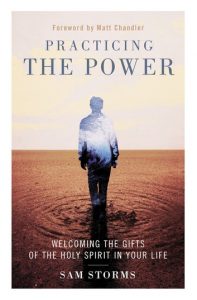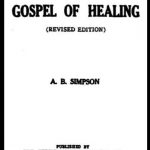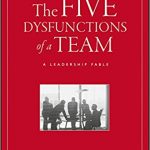Our church, Iron Mill Church, recently finished a series called “Gifted” where we expositionally marched through 1 Corinthians 12-14. We talked about spiritual gifts and gifts of the Holy Spirit. The apostle Paul addresses topics such as speaking in tongues, healing and prophecy, in addition to many other gifts. After the series was finished, my lead pastor gave me a book that he had used for some of the series preparation. It was Sam Storms’s book, Practicing the Power: Welcoming the Gifts of the Holy Spirit in your life.
In this book, Storms is very practical in understanding, experiencing and exercising gifts of the Spirit. The books does not go into depth theologically whether gifts of the Spirit are still active today. From the start, the author says that he is writing to people who already believe the gifts are still being given and used today. This book is primarily written for people who also believe that gifts of the Spirit are active today but are not sure how they should be engaged within worship services and private practice. Storms lays out some specific, practical ways in which these gifts can be used today.
Interesting Pieces
The apostle Paul urges Christians to “earnestly desire the gifts” (1 Corinthians 14:1), and Sam Storms dedicates an entire chapter with this title. Storms even encourages believers to ask prayer from elders to receive specific gifts if they have not received them yet. On page 39, you’ll find a prayer that you can use when asking for gifts of the Spirit.
Although Storms does not have a chapter dedicated to speaking in tongues, he does say that the gift of tongues requires an interpreter, as Paul instructs in these three chapters in 1 Corinthians. He gives an example of Pastor Jack Hayford gently asking someone to not speak tongues publicly at a conference because there was not an interpreter available. The reason Paul gives is that the gifts should be for the benefit and edification of all believers. This example can be found on pages 32-33.
Starting on page 75, Storms gives three steps in practicing healing prayer. The first step is interviewing, listening to the person’s hurts, struggles. The second step is diagnosis. The focus is to determine the cause or source of the condition. It could be the result of living in a fallen world, sin of their own or others, demonic activity, or something else. After the diagnosis, the third step is to pray. This is where we ask for healing in Jesus’s name! Storms says to be as specific as possible about the affliction, the person’s body part and any other details necessary.
On page 96, the author describes a time when the gift of prophecy was used in his own church. An elder approached the author (also lead pastor) to let him know that the elder felt God had given him a word of prophecy. The elder said that he felt God told him that a woman was present in the service who has got a poor prognosis from her doctor ten days ago, and that the initials “SJ” have some connection to the doctor. This elder also said that this woman had a son with asthma. He asked that the woman com forward for prayer. This woman and her son both experienced full and complete healing a short time after this prayer for healing!
Chapter 9 (page 147) deals with demonic activity and how Christians can be delivered from this presence. Storms quote J.I. Packer saying, “whenever God moves, Satan keeps pace.” He goes on to encourage believers in their power and authority being from Christ.
On page 184, Storms says, “cessationism as a theology quenches the Spirit.” The unintended, practical effect of cessationism is to quench the Spirit, leaving many believers lacking the power and giftings that the Spirit desires to impart on them.
In Ephesians 5:19-20, Paul speaks of communicating truth through singing Psalms, hymns and spiritual songs. Storms suggests that the “spiritual songs” are most likely unrehearsed and improvised extolling the beauty of Christ. These songs are not prepared ahead of time, but instead are prompted by the Spirit.
My Thoughts
Storms dedicates large portions of this book to prayer, fasting, healing, prophecy, demonic deliverance, quenching the Spirit, and worship. Some of these topics have multiple chapters dedicated to them; Prophecy has four chapters alone. I wish the gift of tongues had an entire chapter dedicated to its use and practical applications. I am curious to know how this plays out in a local church setting when someone does have the gift of interpretation.
Overall, I enjoyed reading this book since the author is coming from a theological stance similar to my own. I believe that the gifts are still active today. Some Christians believe the manifestation gifts (some call them sign gifts) are not active any longer. Some Christians believe you must possess certain gifts as evidence that of the Spirit’s working in your life. My stance on this topic is that the gifts are still active, but they are orderly and the Apostle Paul gives clear directions on how they should be used within the local church’s context.
If you are interested in purchasing Practicing the Power by Sam Storms, you can buy it here.






